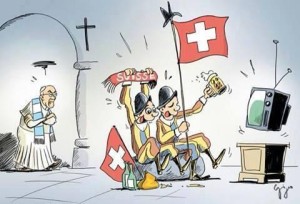 Pope Francis has made it no secret that he loves football. And while Soccer Fever has caught on here in the US during the World Cup these past few weeks, Our Holy Father uses football (and all sports) to showcase how practice, fair play, and respecting opponents are the keys to not only winning a game, but living a joyous and spiritually fulfilling life:
Pope Francis has made it no secret that he loves football. And while Soccer Fever has caught on here in the US during the World Cup these past few weeks, Our Holy Father uses football (and all sports) to showcase how practice, fair play, and respecting opponents are the keys to not only winning a game, but living a joyous and spiritually fulfilling life:
Dear Friends,
It is with great joy that I address you, lovers of football, on the occasion of the opening of the 2014 World Cup in Brazil. I would like to send a cordial greeting to the organizers and the participants; to every athlete and every fan, as well as to all the spectators who will follow this event in stadiums and on television, the radio and internet, an event which crosses language, cultural and national barriers.
My hope is that, more than a celebration of sport, this World Cup can be a celebration of solidarity among nations. This, however, presupposes that the football matches should be considered as what they really are: a game and, at the same time, an opportunity for dialogue, understanding and mutual enrichment of the human person. Sport is not only a form of entertainment, but also — and I would say above all — a tool to communicate values which promote the good of the human person and contribute to building a more peaceful and fraternal society. Just think of loyalty, perseverance, friendship, sharing, solidarity. There are, in fact, many values and attitudes which football promotes and which prove to be important not only on the field but in all fields of existence, and specifically in building peace. Sport is a school of peace; it teaches us how to build peace.
In this sense, I would like to point out three lessons for practicing sports, three fundamental attitudes for the cause of peace: the need to “train”, fair play and respect for the opponent. First, sports teach us that it is necessary to train in order to win. In this practice of sports, we can see a metaphor for life. In life it is necessary “to train”, to strive to achieve important results. The spirit of sports becomes an image for the necessary sacrifices in order to grow in the virtues that are necessary for the character of a person. For a person to improve, extensive and consistent “training” is necessary, and much more is needed to achieve an encounter and peace between “improved” peoples! It’s necessary “to train” a lot…
Football can and should be a school for building a “culture of encounter” which allows for peace and harmony among peoples. And here the second lesson of the practice of sports comes to our aid: we learn what fair play in football has to teach us. When we play on a team we must first think of the good of the group, and not of ourselves. In order to win, we must overcome individualism, selfishness, all forms of racism, of intolerance and of the instrumentalization of the human person. It is not only in football that being fominha [individualistic and egoistic] is an obstacle to positive results for the team. Because, in life, when we are fominhas, ignoring those who surround us, the entire society is damaged.
The final lesson for sports which bear the fruits of peace is the respect deserved by our opponents. The secret to winning on the field, and also in life, is to respect my teammates and also my opponent. No one wins by himself, not on the field or in life! May no one isolate themselves or feel excluded! Be careful! No segregation, no racism! And if it is true that at the end of the tournament only one national team will win the Cup, likewise, it is also true that, by learning the lessons that sports teach us, we will all be winners, strengthening the bonds that tie us together.
Dear friends, I express my thanks for the opportunity which was given to me to address these words to you on this occasion — especially to the President of Brazil, Ms Dilma Rousseff, whom I greet — and I promise to pray so that heavenly blessings are not lacking for everyone. May this World Cup take place in complete serenity and tranquility, always with mutual respect, with solidarity and with fraternity between men and women, who recognize each other as one family. Thank you!
